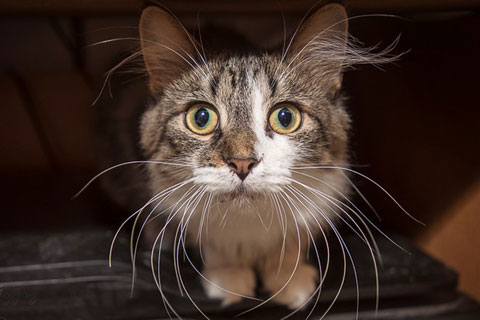Dear Dr. Eisenberg,
I have two cats and 1 dog in my home. Recently, I met someone who told me that she doesn't believe in taking her cats to the veterinarian for yearly check-ups and vaccinations. She feels that since her cats do not go outside, and they appear healthy why bother. She's also heard that tumors can develop at the vaccination site on cat's bodies. The last part of her comment really worried me. My cats have always been provided with the same annual vet care that I've provided for my dog.
- Concerned Pet Owner
Dear Concerned,
I'll answer these important questions by first looking into the statement concerning annual visits. An annual examination of your pet by the veterinarian is important for several reasons. It is usually performed on all pets to notice any changes which may have occurred since the prior visit. Your veterinarian looks for changes in the skin such as hair loss, lumps/bumps, pigment changes, bruising or other discolorations, and hydration status. The examination moves on to the teeth and oral cavity to check for dental disease, ulcers, gingivitis, and missing or fractured teeth. The eyes are checked for cataract formation, light response, discharge and dis-coloration, and abnormal tearing or eye pressure. The ears are examined for inflammation, odor, infection and parasites. The chest is ausculted to listen for abnormal heart or lung patterns. The abdomen is palpated to check for masses and enlargement or displacement of organs. The rectal area is checked for tumors, hemorrhage, ulcers, and abscesses.
All this might take place in the first few minutes of the visit. Based on any behavioral, physical, or weight changes, your veterinarian may suggest bloodwork to explore your pet in greater depth. Annual bloodwork can catch organ changes often before an outward symptom has developed. At the Downers Grove Animal Hospital, we recommend a blood panel that is run in conjunction with the annual heartworm test. In this way, we are able to catch subtle problems occurring with the bone marrow, liver, kidney and pancreas. We have been able to find cancerous liver masses, adrenal gland disease, diabetes, anemia, and primary liver and kidney disorders before pets have shown any unusual outward changes to their owners.
After a complete examination has been performed, your veterinarian will guide you into a discussion about which vaccinations are necessary for your particular pet. Your veterinarian will weigh the many factors involved to determine the risk versus reward of each vaccination. Is your pet indoor and/or outdoor? What are the county rabies vaccination requirements? What diseases are prevalent in your area? Has your pet experienced any prior adverse vaccine reactions? What are the current guidelines by the American Veterinary Medical Association? Based on the answers to these questions, your veterinarian can best determine which vaccines are best suited for your pet.
There are tumors that can develop associated with vaccinations in cats, called sarcomas. These occur anywhere from 1 case/10,000 to 10 cases/10,000. Many were associated with the adjuvent, the liquid vehicle that the vaccine was administered in. They have also been shown to be related to the number of vaccines simultaneously administered at a particular body site. Because of these discoveries, vaccine manufacturers have redesigned the adjuvent, and are conducting new studies related to the duration of immunity provided by the vaccines.
It is important to keep in mind that the purpose of vaccination is to keep up a protective evel of immunity against the more common viruses. It is the indoor pet that will benefit the most from vaccination because it is not being constantly exposed to these viruses the way an outdoor pet is. Most vaccines are extremely safe and effective. They have improved the lives of untold numbers of pets. They play a major role in the prevention of infectious diseases, especially, rabies virus.
With this information in mind, I would recommend that you continue to visit your veterinarian each year, and let your veterinarian guide you through the vaccination options.
Thanks for your letter!
Dr. Ken




 WSHS can accept credit-card donations online using a secure server. Click on the Donate Now button. You can choose how your donation will be used! All donations are tax deductible.
WSHS can accept credit-card donations online using a secure server. Click on the Donate Now button. You can choose how your donation will be used! All donations are tax deductible.